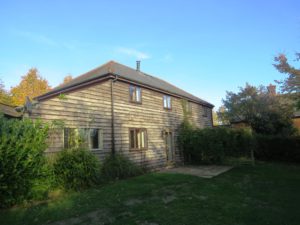2 barn conversions and a flower festival – The Country House Company focuses on Privett
Situated just 6 miles from Petersfield and 8 from Alton and surrounded by stunning countryside, Privett has always been a prime area for property rentals. The Country House Company currently has two properties available to rent in Privett and as sponsors of the Privett Flower Festival being held on 26th and 27th May, the focus is firmly on Privett for The Country House Company.
Both properties available to rent in Privett are barn conversions, one 3 bedroom and the other 3/4 bedrooms. The 3 bedroom property has a large farmhouse kitchen/dining area with flagstone flooring and granite worktops and a spacious sitting room with wood burner and door to the terrace and garden beyond. There is a master bedroom with in built storage and en suite wet room and two further bedrooms and a family bathroom with separate shower. The pretty garden is enclosed and screened by mature hedges. It is mainly laid to lawn with a large terrace, garden pond, summerhouse and log store. There are parking places to the front.



The second barn conversion has been recently repainted and refurbished with newly fitted bathrooms. It has an extremely spacious dual aspect living room with wood burner and access to the garden, a kitchen/breakfast room and recently built study/home office which could also be used as a fourth bedroom. There are 3 double bedrooms, all with fitted wardrobes, one of which has an ensuite shower room and there is a further family bathroom. Outside there is a good sized south facing garden to the rear of the property enclosed by mature hedges and gardening is included.
Both properties are located in the heart of the original farmstead and enjoy idyllic views over surrounding countryside yet are within easy reach of Petersfield and Winchester. Both are available from late May for a 12 month period with the possibility of renewal.
For further details or to view either property please call Kate or Emilie n 023 92 632275
The Privett Flower Festival is being held at Flower Festival at Holy Trinity Church, Privett 26th and 27th May 2018.
Unique 2 bedroom contemporary house
The Country House Company are delighted to be selling this unique 2 bedroom, contemporary house at the edge of Meonstoke with far reaching views over adjoining countryside.
This open, stylish property provides an easy lifestyle with low running costs in a lovely rural village; ideal for working from home and locking and leaving.



The property has an open plan spacious living/dining/kitchen area finished to a high standard with modern fitted kitchen and French windows opening to the garden and fabulous views over the village and countryside beyond.
The modern kitchen is beautifully fitted with wooden effect work surface, tiled floor, integrated oven and ceramic hob, and space for dishwasher and washing machine. There is ample room for free standing full height fridge/freezer.
Both bedrooms are a good size and have plenty of storage and hanging space. One has views across the valley and village, the other looks out to the South Downs Way and fields. The bathroom has a shower system over the bath with fitted screen.
The property has been finished to a high standard and has mellow brick elevations, clay tiled roof, hardwood oak double glazed windows and external oak woodwork.
There is a lawned area to two sides of the house with scope for landscaping plus parking to the front. The garage is a good size.
The house is situated to the edge of Meonstoke, an extremely popular village in the heart of the Meon Valley. Meonstoke is a traditional yet vibrant village with excellent access to the market towns of Bishops Waltham and Wickham, as well as Winchester and Petersfield where stations providing a rail service to London Waterloo can be found (Winchester to London from 59 minutes). There is easy access to the A32 and A272 and the excellent village shop/post office for everyday needs in Corhampton which is within walking distance along with 2 great pubs.
For full details or to arrange a viewing please call Marishelle at The Country House Company on 023 92 632275 www.counryhousecompany.co.uk
The Holt is a delightful 3 bedroom cottage available for sale through The Country House Company.
Situated in the centre of the sought after village of Newton Vallence, The Holt has character features including beams and inglenook fireplace and a mature cottage garden.




The fitted kitchen has beams, double oven and hob, double sink unit and tiled floor. To the other side of the entrance hall is the spacious sitting room with a lovely large inglenook working fireplace, beams, built in shelving and cupboards and windows to the garden. The second reception room provides additional space and would work well as a study. There is also a bathroom with shower over bath and utility room on the ground floor.
The first floor offers a generous master bedroom with fitted wardrobes and two further double bedrooms each with good storage and family bathroom.
The Holt has a lovely private garden with flower beds, patio and steps to lawned area and is bordered by mature hedges. There is a graveled parking area to the front for off street parking.
The cottage is semi detached and in a lovely village location, moments from the village pond and church. Newton Vallence is a hamlet to the South East of Selborne with a strong village community. Selborne is under 2 miles away and has a local shop, a pub, boutique and Gilbert White’s Natural History of Selborne museum. Newton Valence is 7 miles south of Alton which has extensive shopping and leisure facilities and mainline station to London. There is also a railway station at Liss and the nearby A32 provides easy access to Alton, Guildford, Winchester and London.
For full details on this property or to arrange a viewing please contact Kate at The Country House Company on 02392 632275 or email kate@countryhousecompany.co.uk
Here at The Country House Company we were delighted to hear that the government has revealed a huge overhaul of the industry that will include mandatory qualifications for agents and greater transparency about referral fees. It is frustrating, when there are so many professionals in the business, that the reputation of an industry can be tarred by the actions of a few rogue agents. We do not charge referral fees and are careful to ensure that any referrals we make are only when a client has asked for information on a solicitor, surveyor, mortgage broker, insurance agent or such like. We would only recommend professionals we have worked with in the past or have been recommended and we are confident of their service.
In a previous blog I mentioned the amount of legislation that has to be dealt with by landlords and agents. Some of this legislation is for the good of the industry and the introduction of mandatory qualifications, greater transparency and more accountability is to be encouraged and supported across the industry.
Secretary of State for Housing Sajid Javid stated, “We will require estate agents to hold a qualification so that people are no longer at risk from a minority of ‘rogue agents’ and can trust the process when buying or selling their home”.
We are professional, qualified and are members of ARLA Propertymark, and looking forward to other agents having to reach the same standard; trust us to help you through the process.
Marishelle Gibson
Was the headline for an article in The Saturday Telegraph Property supplement sub titled ‘The commuter hotspots on London’s compass points’. Without even reading the article I was confident that Hampshire would feature which of course it did along with other obvious contenders, Berkshire, accessible parts of Essex and Kent and Hertfordshire to the north east of London. Each ‘home county’ has the benefit of beautiful countryside with accessibility to London but that also comes with a price tag for the property in it. As the article states ‘There is always a catch, the better value home may come with a longer commute’. Hampshire has its expensive hotspots and prices certainly went up when the the Hindhead tunnel opened making the journey into London under an hour by road or rail from Haslemere. However there are other beautiful spots south of Haslemere, close to Petersfield, or within the Meon Valley or the South Downs where property has the benefit of being within a commutable distance of London without the exceptional premium.
‘Woodside’ is a fine country house offering 5 bedrooms, 3 reception rooms, 4 bath shower rooms, 2 bedroom annex with conservatory, double garage with games room/workshop and office and gardens of approximately 2 acres. Perfect for family life, it has beautiful countryside close at hand and Bohunt School, winner of the TES Secondary School of the Year, is within walking distance. Situated in a peaceful country lane it is only 1.5 miles from Liphook which has a mainline station and is close to the A3 giving direct access to London by road or rail.
‘Forest Gate’ is another beautiful country home with access to the South Downs, yet is just 12 miles from Petersfield where the mainline station and the A3 provide a direct link to London in just over an hour. Situated just outside the village of Hambledon it is a Grade ll listed handsome Georgian house dating from the 18th century with later additions. It offers 5 bedrooms, 4 reception rooms, gardens and grounds of approximately 1.5 acres with tennis court, double garage and outbuildings.
So, no catch to property in this area just beautiful countryside, excellent schools, historic cities, wonderful market towns and all within easy access of London.
Marishelle Gibson
A report from Foxton’s recently pointed out that in the last five years over 150 new regulations have affected landlords; ranging from responsibility for tenants residency status to licensing requirements, enhanced maintenance criteria and increased financial sanctions.
This has created a potential minefield for landlords as they negotiate their way through preparing a property to rent and maintaining the tenancy. However this is exactly what we are trained to do. For a professional Lettings Agency like The Country House Company complying with legislation and keeping up to date with changes is vital to ensure we give a thorough service to all our landlords and that we take the stress out of letting a property. It may not be the most enjoyable aspect to letting but it is a challenge the team enjoy enjoy meeting.
The most enjoyable part of the job is showing the wonderful properties we have, matching the right tenant to the property and giving the landlords a stress free experience!
Marishelle Gibson
With Easter and spring around the corner now is a wonderful time to daydream of boxes of chocolate and ‘chocolate box’ cottages in quintessential English villages. We can help that dream by tempting you with some of the delightful properties we have available to rent or buy in the beautiful villages in and around the Meon Valley and South Downs.
How about a former groom’s cottage located within the listed stable yard of a substantial country estate? Situated in the village of Steep Marsh it is surrounded by wonderful parkland with far reaching views yet immediately accessible to the A3 and just 3 miles from Petersfield mainline station.
Or consider an idyllic thatched mid terrace cottage overlooking a river to the front and fields to the back. The cottage has chocolate box appeal on the outside and is delightful inside with beams, exposed boards and beautifully restored English oak doors.
Equally tempting could be a perfect rural retreat; a pretty 2 bed annex in the grounds of the neighbouring farmhouse with wonderful views and access to the South Downs.
So settle down with that box of chocolates, browse through The Country House Company website and see how the dream can come true!
Marishelle Gibsson
As the first signs of spring are showing, so are the signs for The Bluebell Ride (previously held at the Bereleigh Estate) which is again being held at The Longwood Estate, Nr Winchester on Sunday 22nd April. The Country House Company has supported this event for many years and we are always proud to see our signs across the area advertising the event.

The ride is an 8 mile Cross Country Course with approximately 40 optional jumps through beautiful bluebell woods in the Longwood Estate. There will be stewards around the course located at jumping areas. The Estate is located just to the South East of Winchester, a part of Hampshire which combines pleasant woodlands with lots of tracks and areas where there are stunning views across to the Isle of Wight on clear days. Directional signs will be put up to ensure easy approaches.
Proceeds will go towards The Hampshire and Isle of Wight Air Ambulance Services www.hiowaa.org
For course details, entry form and full details please see www.bluebellrides.co.uk
For full details on The Country House Company please see www.countryhousecompany.co.uk

There has been some publicity recently on the rights of landlords to stipulate whether or not applicants with pets are allowed to be considered as potential tenants. No doubt this is an argument that will rumble along for a while and here at The Country House Company we have landlords with properties where they welcome pets, others where they allow dogs but not cats and visa versa, and others where they would rather not have pets at all.
We totally respect the wishes of the landlord. When we first meet a landlord a vital part of the conversation is the profile of the tenant they are looking for. The landlord usually has a clear idea of the suitability of the property be it for individuals or families with or without pets, and our job and expertise as a letting agent is finding the right tenant for that property.
We spend time with the applicants and the landlords to ensure the match is going to work for both parties. One of the keys to being a good letting agent is having the training and experience to know when an applicant is right for a property and the patience to wait and be thorough in finding the perfect match – one of the many enjoyable and rewarding aspects of this profession!

